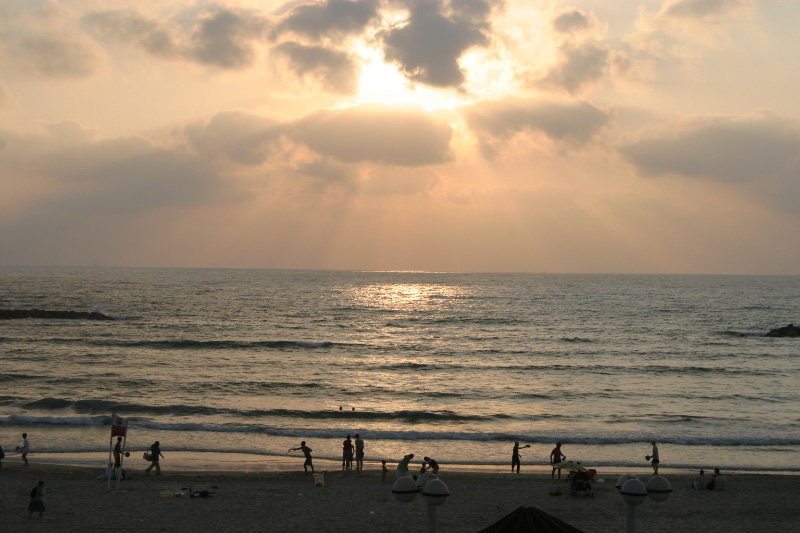
by Mel Weiss
A Busman’s Holiday in Tel Aviv

Sunset in Tel Aviv-Yaffo beach
There’s seriously nothing like a two-week stint in Israel, with an extended weekend layover in New York City, to throw one’s shlicha mission in mid-Maine into a serious sort of relief. At least, that’s how it was for R. and me, coming back to the small town in Maine where she basically serves as the town rabbi and I, well, I do many of the things a rabbi’s partner does in a small town, even though in the old days, the rabbi wasn’t a woman—nor was she partnered to one. We returned to what we jokingly, or not so jokingly, refer to as our role as the Lesbian Chabad of Mid-Maine.
We’re just back from a well-deserved vacation, in a place where even the vacation have a veneer of the hectic. (Plus, a rabbi on vacation in Israel can, at times, feel a bit like a busman’s holiday.) Having eaten schwarma, spoken Hebrew, argued in the shuk and visited a vast array of friends, teachers and family, we’re back in the Northeast, having lugged as much of the Middle East home in our backpacks as we could.
It was a fun experience, telling Israeli friends about what we’re doing up here. The Lesbian Chabad joke works both much better and far worse: some of our friends laugh harder than any American at the idea, while my extremely secular cousin worriedly asks if I have to pass out candles in the bus station on Friday afternoons.
And the fact of the matter is that it is hard—it might actually be impossible—for Israelis who haven’t spent time in America (outside, perhaps, of New York and LA) to imagine not only why on earth we’d want to spend our time doing what we do, but how such a thing could possibly be necessary.
This is what occurred to me, sipping coffee one impossibly hot morning in Tel Aviv: there is no doubt that Jewish life is a hundred, a thousand times easier in Israel. That holds true, in a slightly different way, in New York, where I hail from. There is an insane array of options in both places—they’re veritable buffets of Jewish identities, experiences, organizations and resources. Whereas we, the two of us and the people we choose to live here for, are more like the homespun diner where options are limited to whatever the cook feels like whipping up.
But here’s the flip side of that, I realized: I was never responsible for creating anything Jewish for myself when I lived in New York or Israel. That is, I was able to take from those options available to me, mix and match a set of knowledge and experiences and fashion a sense of self and identity out of them. It might have been a Jewish experience that fell outside of the box, but in a sense it was out-of-the-box, too, the way everything from software to cake mixes arrives these days. Just add water—instant Jewish identity.
But up here, deep within the tracts of pine trees, where we watch out for moose as we head out for services—here we make Jewishness from scratch. It takes time, and effort, and occasionally someone burns a hand, but the effort, when it comes time to partake and enjoy, is something from which we draw immense pride. That holds true, obviously, for R. and myself, the bearers of the recipes we bring with us from down the coast and across an ocean. But it holds true for the residents of C-town, too, who want desperately to join in the process of creating something for themselves, who are willing to stand with us in a hot kitchen and put their backs into the effort.
(Lest you think those last two paragraphs merely an extended flowery metaphor, please know that I am writing this having just packed a large container of kosher chicken to prepare for a communal meal, and when I finish this post, I’m moving on to vegetables. At most, it is an extended floury metaphor.)
So, yes. Just home, and already I miss the sound of Hebrew, the sight of kippot on the subway. But I know my history, and I’m always happy to remind others of how we got here. We’re chalutzot, pioneers, in the finest tradition, and we’re building something beautiful, every day.